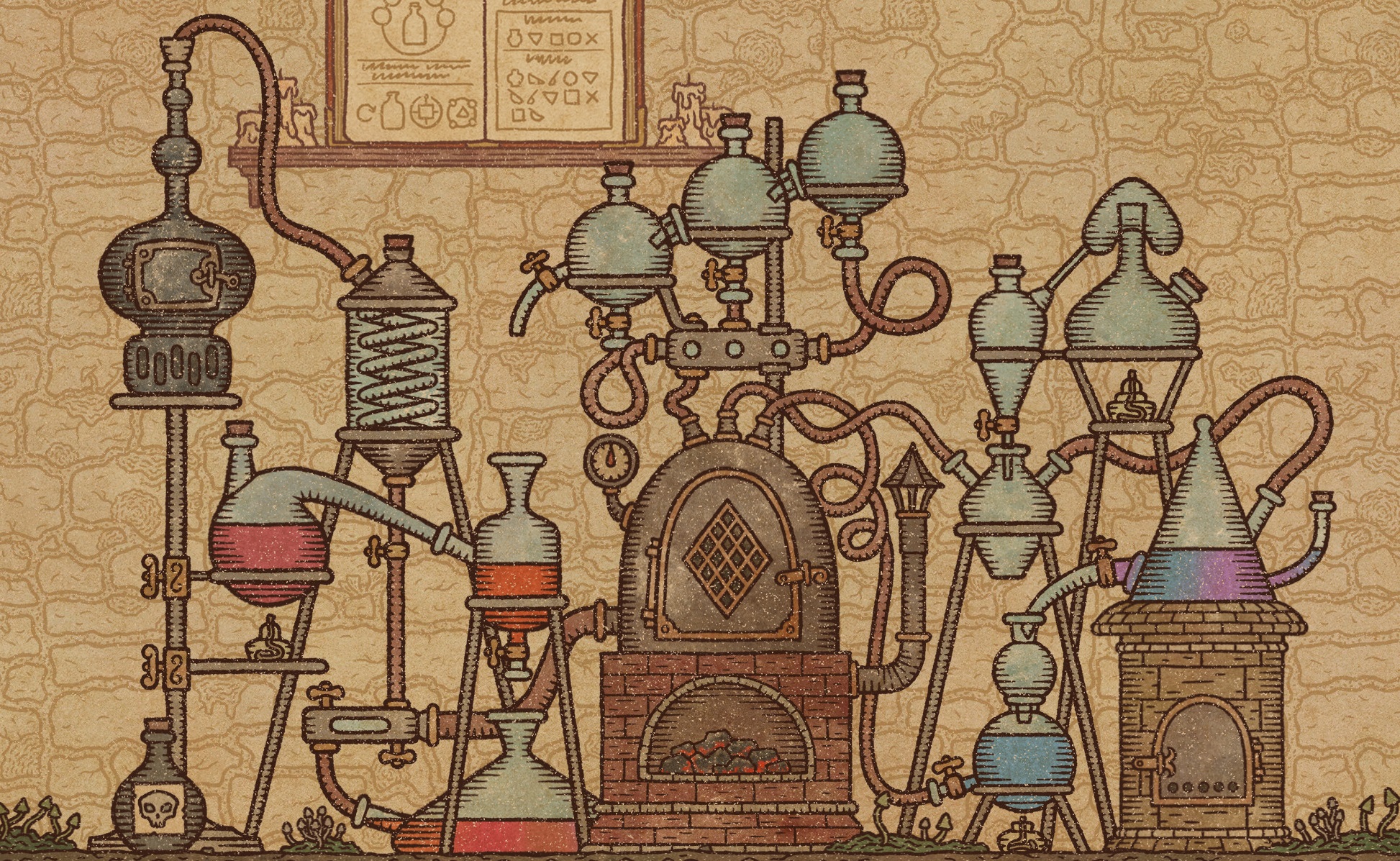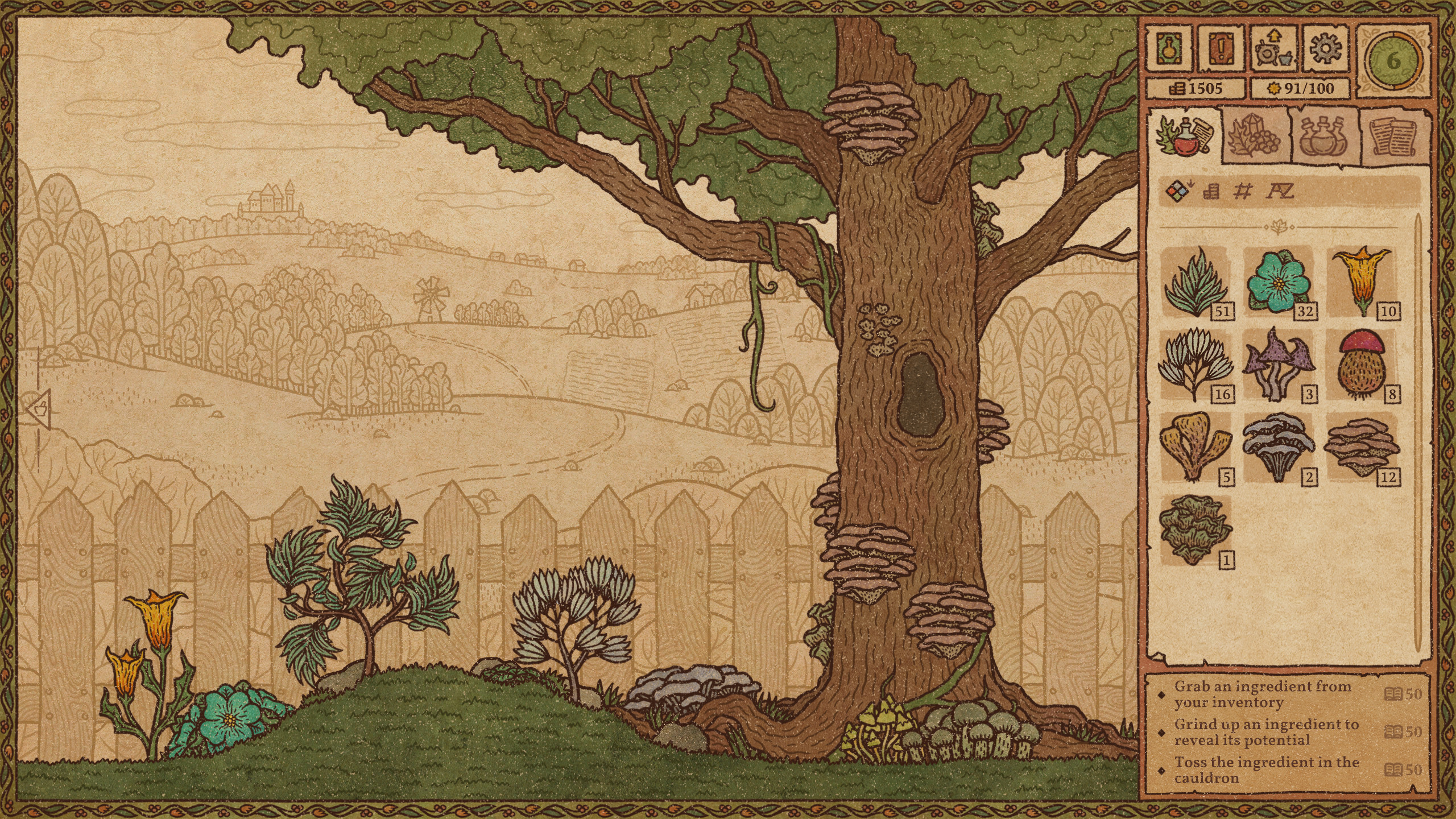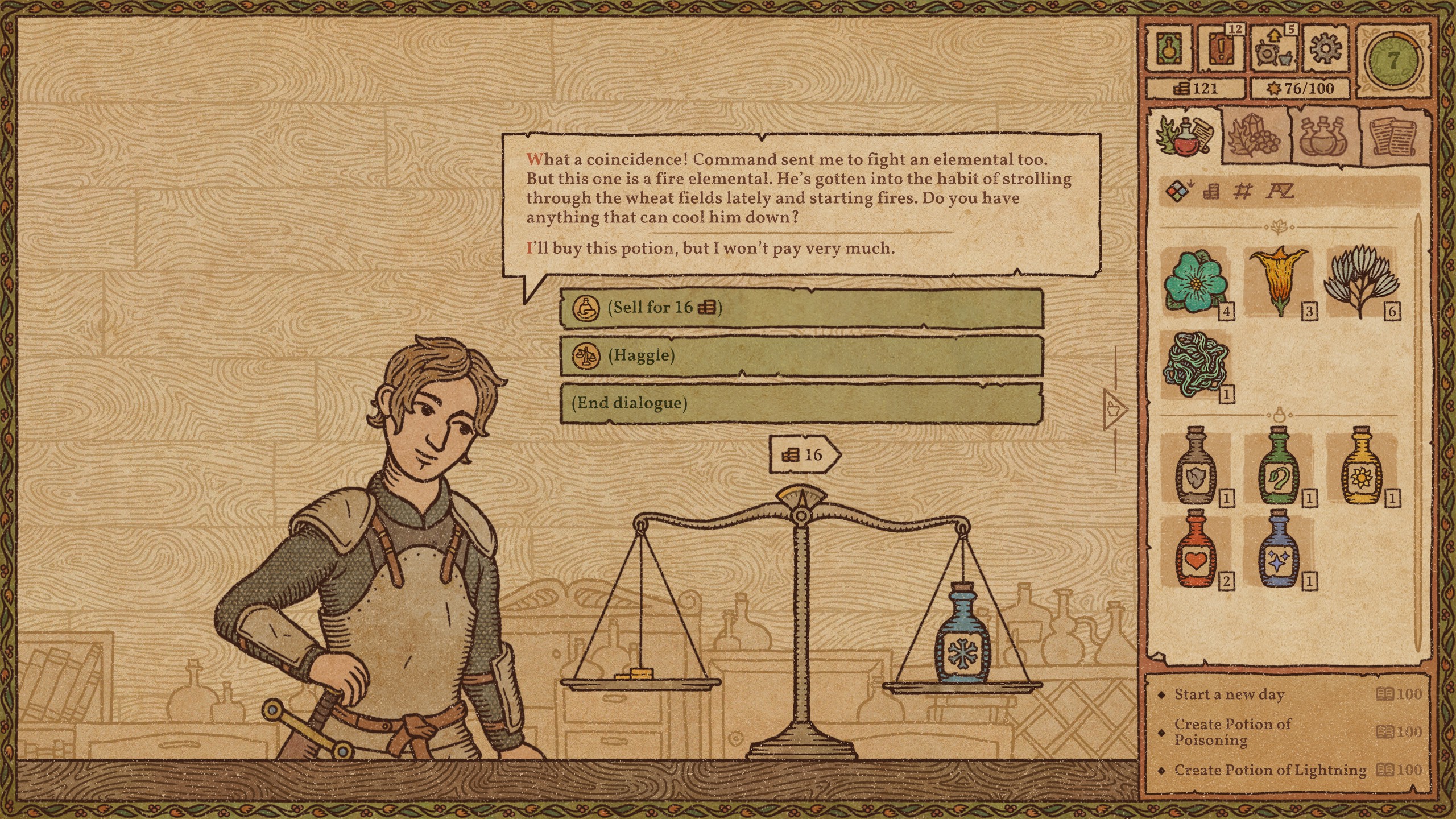Potion Craft has finally given me a crafting system I don't hate
Alchemy is my new best friend.

When I was still in single digits, I went through a potion-brewing phase. Inspired by Roald Dahl's George's Marvellous Medicine, I was convinced that with the right ingredients I too could concoct a magical elixir, though not to murder my grannies, who were lovely. Instead of hitting up the medicine cabinet, I took advantage of all the farms and woods nearby to create my brews. Liquids, slimes, mushrooms, manure—everything went in the bucket. I never could find any guinea pigs, sadly, and there was no way I was going to slurp down that bubbling, foul-smelling bile first. But now, thanks to Potion Craft: Alchemist Simulator, I've got queues of people willing to pay for the privilege. I think I've found my calling.
Usually, when a crafting system rears its head, I roll my eyes. I've seen too many of them and now they all blur together in a monotonous montage where I'm wasting my life just squashing resources together. Creating each new recipe in Potion Craft, however, is like going on a mini adventure, with each ingredient pushing you further into the unknown. And you do this without leaving your cauldron's side. It's weird and abstract, but captures the magic of invention and creation in a way more 'realistic' crafting systems often don't.
I found myself charmed before I even opened up my potion shop, after gawking at screenshots of art inspired by medieval manuscripts. Simple, playful animation maintains the manuscript aesthetic while slapping a bit more whimsy on top of it, usually to make interacting with your little shop just that bit more satisfying. When you pick up some flowers to throw in the pot, there's a wee puff of leaves, and when you start mashing things up with the mortar and pestle, little crumbs splash out, while your tools become stained with the colour of whatever they're grinding down. It's damn delightful.
All the mashing and stirring and pumping has to be done by hand, making it tactile, but never hard work. There's no QTEs or bits where you're hammering buttons—at least not when you're brewing potions. Instead, you've got to take your potion on a journey, which is expressed literally via a map full of magical effects and dangers you'll want to avoid. Each ingredient takes the potion in a specific direction, following its own unique path. The more you add, the further afield your potion goes, passing through experience nodes and effects, until you decide you're done.
The map is a complete mystery until you start pushing through the fog, though with upgrades you can increase your vision radius, giving you a better idea of where you should head next. Effects can be mixed to create more elaborate potions, egging you on to continue exploring and searching for new ones—but there's a risk it will all go to waste, as some parts of the map can destroy your potion. Thankfully dangers are easy to avoid, and if you've gone too far in the wrong direction and find yourself trapped, adding a bit of water will start moving the potion back towards the centre. There's usually a way out of a pickle.

Every screen is a separate room in this formerly abandoned wizard's hut, and below the potion brewing room is a basement entirely taken up by a complicated tangle of tubes, jars, valves and, at the centre, an imposing furnace. This massive chemistry set is where you can start tinkering away even more with your potions, but in the demo build it's not available. There's also a garden, where you can pick up ingredients, a bedroom that lets you move to the next day, and then the money-maker—the shop.
I'm a wee bit less enchanted with the retail side of things, but that's mostly down to the haggling system. Every customer comes in with a story and a potion request, striking a good balance between the fantastical and mundane, and if you can find what they need, they'll name their price. Then you can try to bleed a bit more money out of them in a mindless haggling minigame where you keep slamming the 'Haggle' button at the right time. I think I'd prefer just losing the cash.
Keep up to date with the most important stories and the best deals, as picked by the PC Gamer team.
Otherwise, it's got a lot of potential. There's a reputation system that can attract and put off customers, but there's also the hint of something more complex, that maybe there are benefits to a bad reputation. See, as well as folk popping in to get cures for indigestion and potions to make their crops grow faster, you'll occasionally be approached with more sinister requests. One bloke needed some poison, no questions asked, and was clearly up to no good—I sold him the foul stuff anyway, at the cost of my good reputation. Then he came back, looking for more, and made it very clear that I was in this with him now.

Eventually, you'll make friends, enemies and get the chance to work with guilds, but even without all of that I've been utterly content. All this future stuff sounds great, but I'm quite happy to be locked in my backroom, making colourful powders and bubbling elixirs. The potion saving feature also stops the business of brewing from becoming too repetitive. If you expect to make a lot of a potion, you can save it, allowing you to simply click on it in your recipe book and conjure it up instantly, as long as you've got the ingredients. This means that when you do it manually, you're usually experimenting. It's never pointless busywork.
Potion Craft could probably get by on charm alone, but thankfully it's also shaping up to be a clever, abstract alchemy sim. If gritty, numbers-heavy business management is your obsession, this probably won't scratch your itch—it's not really a conventional business sim—but you might as well download the Steam demo anyway, because it's great.

Fraser is the UK online editor and has actually met The Internet in person. With over a decade of experience, he's been around the block a few times, serving as a freelancer, news editor and prolific reviewer. Strategy games have been a 30-year-long obsession, from tiny RTSs to sprawling political sims, and he never turns down the chance to rave about Total War or Crusader Kings. He's also been known to set up shop in the latest MMO and likes to wind down with an endlessly deep, systemic RPG. These days, when he's not editing, he can usually be found writing features that are 1,000 words too long or talking about his dog.

